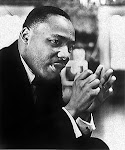I remember when my wife was first pregnant reading the baby book warnings that once pregnant you become public property. That strangers will comment on the big belly, and even touch a pregnant's woman stomach. I thought how odd. What would possess a stranger to have the audacity to do that to a stranger, pregnant or not. I did see a smidgen of that sort of thing during my wife's pregnancies--especially when she was carrying my boy (he was a really big baby...9+ pounds...and my bride's belly reflected that fact). But, all in all, there was no real public property effect from pregnancy.
I've also lived overseas in a country where white people were the minority--and rarely seen in very rural areas that I visited at times. At times, kids would be fascinated by the foreigner--and his hairy forearms. So, that was a bit of an experience in being public property.
But, neither of those experiences approach the public-property aspect that comes with being my boy, or with my boy. Simply put, it's impossible to go anywhere without receiving at least some stares and comments. Usually they're good-natured. The stares are most-commonly from curious people who are (1) amazed that a 3-1/2 year old can control a powerchair so deftly; (2) taken by how damn cute my boy is; or (3) impressed at how cool my boy's "red-racer" is (thanks to permobil for making a great-looking pediatric powerchair). These good-natured looks don't bother me. They are momentary and they come from a not-bad place.
But, then there are the two types of stares that make me want to rip people's faces off. First, the open-mouthed gape. These are the folks who glare and don't look away after a second or two. In fact, don't look away even after a mother-bear or papa-bear glare back. These are the people who turn their heads...sometimes their bodies...to keep staring. Really pretty unbelievable. Rare, but enraging.
Second, the "oh, how sad" puppy dog stare. It's when you just know the brain behind those eyes is thinking "poor little boy" or "poor family." It makes me want to say "save your goddamned pity for someone who needs it--we sure don't." What the puppy-dog starer doesn't know is that my boy is not sad, or unfortunate, or an object worthy of pity. He's a happy, funny, and deeply-loved kid. And, our family neither needs nor wants anyone's pity. We're happy as hell. As my wife said to me the other day -- we dance. We fucking dance! In every possible way. It's what we do. And, if you can't dance, well, you know the rest... (thanks for that one, Emma G).
So, those are the looks. But, public property manifests itself verbally and not just visually. The comments, too, fall into several categories, but that is a topic for a future post.
CONVERSATIONS ABOUT INTER-ABLED ROMANCE, part 5
10 years ago









